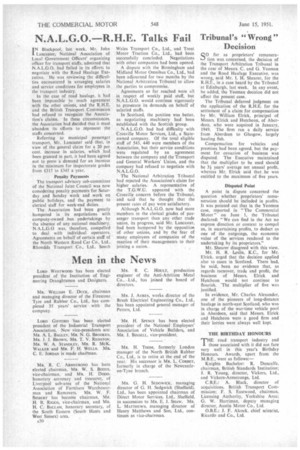N.A.L.G.O.—R.H.E. Talks Fail
Page 32

If you've noticed an error in this article please click here to report it so we can fix it.
I N Blackpool, last week, Mr. John Lancaster, National Association of Local Government Officers' organizing officer for transport staffs, admitted that N.A.L.G.O. had failed in its efforts to negotiate with the Road Haulage Executive. He was reviewing the difficulties encountered in arranging salaries and service conditions for employees in the transport industry.
In the case of road haulage, it had been impossible to reach agreement with the other unions, and the R.14.E. and the British Transport Commission had refused to recognize the Association's claims. In these circumstances. the Association had decided that it must abandon its efforts to represent the staffs concerned.
Referring to municipal passenger transport. Mr. Lancaster said that, in view of the general claim for a 20 per cent, increase in salaries, which had been granted in part. it had been agreed not to press a demand for an increase in the minimum for inspectorate grades from £315 to £345 a year.
Penalty Payments The transport advisory sub-committee of the National Joint Council was now considering penalty payments for Saturday and Sunday work and work on public holidays, and the payment to clerical staff for week-end duties.
The Association had been greatly hampered in its negotiations with company-owned bus pndertakings by the absence of any national machinery. ' N.A.L.G.O was, therefore, compelled to deal with individual operators. Agreements on behalf of certain staff of the North Western Road Car Co.. Ltd.. Rhondda Transport Co., Ltd.. South Wales Transport Co., Ltd., and Trent Motor Traction Co., Ltd., had been successfully concluded. Negotiations with other companies had been opened.
A dispute with the Birmingham and Midland Motor Omnibus Co„ Ltd., had been adjourned for two months by the National Arbitration Tribunal to allow the parties to compromise.
Agreements so far reached were alt in respect of weekly paid staff, but N.A.L.G.O. would continue vigorously to prosecute its demands on behalf of salaried staffs.
In Scotland, the position was better, as negotiating machinery had been established with the Scottish group.
N.A.L.G.O. had had difficulty with Crosville Motor Services, Ltd., a Stateowned company. Of the total eligible staff of 543, 440 were members of the Association, but their service conditions were regulated by an agreement between the company and the Transport and General Workers' Union, and the company had refused to negotiate with N.A.L.G.O.
The National Arbitration Tribunal had rejected the Association's claim for higher salaries.A representative of the T.G.W.U. appeared with the Crosville concern before the Tribunal, and said that he thought that the present rates of pay were satisfactory.
Although N.A.L.G.O. now had more members in the clerical grades of passenger transport than any other trade union, its progress, said Mr. Lancaster, had been hampered by the opposition of other unions, and by the fear of many employees of companies of the reaction of their managements to their joining a union..




























































































